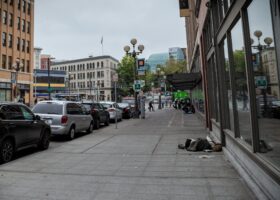Pierce Co. Executive Dammeier, “housing will never solve homelessness, community will.”
September 6, 2024
We interviewed Pierce County Executive Bruce Dammeier on the innovative program (based on success elsewhere) his administration is using to reduce long-term homelessness. The “community first” method differs from the failed “housing first” philosophy in that it doesn’t ignore the fact that addiction and mental health are major contributors to the crisis. Executive Dammeier also shared his views on other related topics, including his strong opposition to a “Pierce County Regional Homeless Authority, calling such regional approaches, “expensive failures.”
Your administration has searched the country to find solutions to Pierce County’s homeless problem. You have toured the Community First! Village in Austin, Texas and you came away impressed. What is it about this effort that distinguishes itself from what other communities have done?
Many of those experiencing chronic homelessness struggle with a mental health condition, substance abuse, other disabling conditions, and have been homeless for more than a year. This population makes up the visible homeless: the people living in tents, in doorways, and in our public rights-of-way. One would be hard pressed to find a jurisdiction dealing with this population successfully.
The trauma and years of addiction and mental illness take their toll. Efforts to move the chronically homeless into converted hotels or other multi-family housing only increases their isolation and offers little accountability. The result is often failure with studies showing success rates declining the longer a person remains on the streets.
In 2021, we investigated several housing models and found a proven solution that offers dignified housing, real accountability, and hope. The Community First! Village (CFV) in Austin has a record of successfully lifting people out of chronic homelessness. After nine years in operation, it reports a remarkable retention rate of 85%. CFV’s model doesn’t take the traditional housing first approach that provides housing and little else. What makes this model stand out was its unique belief that “housing will never solve homelessness, but community will.”

You have sought to use Austin as an example and build a similar project in Pierce County. Please describe the features and the status of the Good Neighbor Village being developed near Spanaway.?
Like Austin, the residents of the Good Neighbor Village in Pierce County will receive onsite addiction and mental health treatment, be offered onsite employment opportunities to help them pay rent, will be required to comply with a code of conduct that requires them to be good neighbors and obey the law, and will live alongside dedicated volunteers to help build community.
Please see my blog: They like us! – Pierce County Executive (piercecountywa.gov). The Tacoma Rescue Mission expects a decision from the Hearing Examiner on motions for reconsideration shortly, and to break ground this fall. They hope to welcome their first resident in late 2025.
There has been discussion over whether to form a Pierce County Homeless Authority. Given the very negative perception of the efforts of the King County Regional Homeless Authority, it is surprising to many people that other counties would seek a similar approach. What are your thoughts on forming a homeless authority in Pierce County?
Respectfully, I do not see a record of success when I look at some of the regional approaches to homelessness, including King County. Instead, I’ve seen expensive failures, intolerable delay, growing squalor, less dignity, and government overreach. A “Unified Regional Approach” is the creation of the Pierce County Council majority, and I have shared my reservations about this approach. I am also concerned that Council recently attempted to allow large tent encampments to be established throughout Pierce County with almost no public notice. I can’t support these policies and I vetoed that legislation.
To your north, King County Executive Dow Constantine received criticism for his comment that “it is wrong” to believe that the homeless crisis is the result of addiction and mental health issues and that “a housing market failure” is the principal cause for the record number of homeless. Do you believe the same thing is true in Pierce County?
Most people experience homelessness because of a loss of employment, fleeing a violent partner, a major financial setback, or an increase in rent they can’t afford. We have programs to help with the first month’s rent, emergency shelter, and vocational training to help them get back on their feet.
But over 50% of homeless reported in a Seattle-area study that drug addiction and mental illness led to their homelessness.
I participate in our annual Point in Time (PIT) count of mostly chronically homeless residents. Each year, our Human Services team leads a community effort to conduct this “Count” to meet a Federal Department of Housing and Urban Development (HUD) requirement. It is a big effort. The encampments I visited this last January were still incredibly unsafe and unsanitary.
I saw evidence of crime and violence – and significant amounts of untreated mental illness and addiction. There were more RVs and more people sleeping in their cars this year than in my previous counts. It breaks my heart to witness this in our community.
But I saw something else this year that gave me hope. For the first time, I saw several people express an interest in getting help and getting off the streets. In the past, our outreach workers would be prompting folks about services.
This year they came up to us and asked about getting support. Later, when talking with other Count teams, I heard many similar stories. We need to invest in the right kind of long-term housing, with a vibrant and supportive community, that addresses mental health and addiction for these folks to be permanently housed.
Will the recent U.S. Supreme Court decision on the Grants Pass v Johnson case (reversed lower court rulings and allowed local jurisdictions to again impose penalties on those who don’t comply with no camping ordinances) alter how the county enforces public camping bans? …
The lower court decision overturned by Grants Pass did not restrain local governments from removing unauthorized encampments. The County began removing unauthorized encampments in 2019 and resumed cleanups once the Governor’s Covid-related moratorium ended. From 2019-2023, our Planning and Public Works team has removed 191 encampments in incorporated Pierce County.
As you near the end of your second term as Pierce County Executive, what advice would you give your successor on the next steps to help those who are homeless?
I have spoken of the importance of hope, dignity, and purpose in the human experience. With all three, one is well on the way to living a fulfilling life. Without any one of the three, life is a shell of what it could be and, sadly, describes the chronically homeless people I have met.
My hope for the next Executive is that they are committed to dignified, effective housing solutions that offer hope, and get people mental health care, addiction treatment, and housing within a supportive community.




